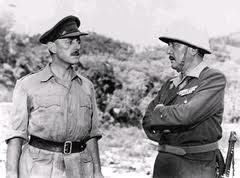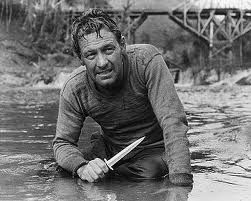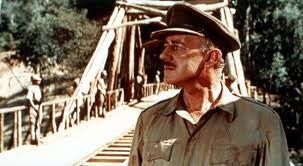I did not expect to like this movie when the main boast on the back of the DVD was that it spawned a "classic whistling song," but it was pretty good. The acting was great, notably Alec Guinness and William Holden, and it held my interest throughout.
 It takes place in a Japanese prison camp during WWII. William Holden is Shears, a captured American soldier, and Alec Guinness is Nicholson, the Colonel of a British unit that was ordered to surrender to the Japanese. Nicholson has some unusual ideas about what his duties are as a captured soldier. For one, though Shears manages to escape, Nicholson feels that his men shouldn't attempt it, because they were ordered to surrender, so escaping could be considered treason. He also strongly feels that, while he believes they should cooperate with their captors (including the commander of the prison camp, Saito), he would rather die than authorize his officers to assist in the menial labor (they are trying to build a bridge over, you guessed it, the River Kwai): "I'm adamant. I will not have an officer from my battalion working as a coolie." There is a huge power struggle between him and Saito, and he nearly dies. Saito finally concedes the point when he realizes he needs Nicholson's help to get his men to complete the building of their bridge on schedule.
It takes place in a Japanese prison camp during WWII. William Holden is Shears, a captured American soldier, and Alec Guinness is Nicholson, the Colonel of a British unit that was ordered to surrender to the Japanese. Nicholson has some unusual ideas about what his duties are as a captured soldier. For one, though Shears manages to escape, Nicholson feels that his men shouldn't attempt it, because they were ordered to surrender, so escaping could be considered treason. He also strongly feels that, while he believes they should cooperate with their captors (including the commander of the prison camp, Saito), he would rather die than authorize his officers to assist in the menial labor (they are trying to build a bridge over, you guessed it, the River Kwai): "I'm adamant. I will not have an officer from my battalion working as a coolie." There is a huge power struggle between him and Saito, and he nearly dies. Saito finally concedes the point when he realizes he needs Nicholson's help to get his men to complete the building of their bridge on schedule.According to Wikipedia:

"Alec Guinness later said that he subconsciously based his walk while emerging from "the Oven" on that of his son Matthew when he was recovering from polio. He called his walk from the Oven to Saito's hut while being saluted by his men the "finest work I'd ever done.""
Nicholson proceeds to instruct his men to build the best bridge possible, prompting fellow soldier Clipton to say, "The fact is, what we're doing could be construed as - forgive me sir - collaboration with the enemy. Perhaps even as treasonable activity. Must we work so well? Must we build them a better bridge than they could have built for themselves?" Nicholson answers that "One day the war will be over. And I hope that the people that use this bridge in years to come will remember how it was built and who built it. Not a gang of slaves, but soldiers, British soldiers, Clipton, even in captivity."
After his escape, Shears is happily convalescing, ready to be sent home and wooing a nurse ("You give me powders, pills, baths, injections, enemas; when all I need is love."), when he is forced into a mission back to the prison camp to destroy the bridge. When Nicholson discovers that they are trying to destroy the bridge, he attempts to stop them, turning on his own people to defend the bridge his men have built. When he recognizes Shears and realizes that he has betrayed his own people, he exclaims "What have I done?" and manages to complete the mission and blow up the bridge.

As the movie ends with the explosion of the bridge and death all around, we see Clipton observing the chaos and destruction with the exclamation: "Madness!... Madness!"
Bummer of an ending, with pretty much everyone biting the dust, but a memorable movie, and an intriguing look at the meaning of honor and the destruction of war.
To hear the famous whistling song, look up "Colonel Bogey."

I was shocked with Alec Genuineness character in this movie. He was clearly aiding the enemy and to the best of his ability! If I were him I would have whipped out my light saber a lot earlier and beaten some Japanese buttox.
ReplyDeleteThank you for this contribution, my love. I don't think I fully considered the light saber component of this film. This is not the bridge you're looking for...
ReplyDelete